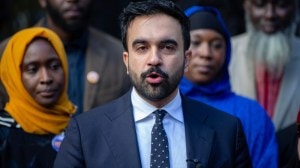Justice A M Khanwilkar: Aadhaar to UAPA to PMLA, he authored many crucial orders
Khanwilkar, 66, is only the second chairperson of the Lokpal. Appointed as a judge of the Bombay HC in March 2000, Khanwilkar served as CJ of the Himachal Pradesh HC and Madhya Pradesh HC, before being elevated to the SC.
 Justice A M Khanwilkar. (File photo)
Justice A M Khanwilkar. (File photo)After nearly two years, the new chairperson of the Lokpal, former SC judge Justice (retd) A M Khanwilkar, was appointed Tuesday.
Khanwilkar, 66, is only the second chairperson of the Lokpal. Appointed as a judge of the Bombay HC in March 2000, Khanwilkar served as CJ of the Himachal Pradesh HC and Madhya Pradesh HC, before being elevated to the SC.
Soon after, he was a part of the majority ruling in the five-judge Bench that decided to decriminalise homosexuality. In 2018, he was part of another Constitution Bench decision, in which the court held that the right to die with dignity formed an integral part of the right to life and liberty under Article 21, thus legalising passive euthanasia for patients with terminal illnesses.
In September 2018, Justice Khanwilkar was part of the five-judge Constitution Benches in the landmark Aadhaar and Sabarimala cases.
In 2020, he authored the decision to uphold the Foreign Contribution (Regulation) Amendment Act, 2020. In 2021, he authored the three-judge Bench judgment establishing the protocol that state governments must follow before reserving seats in local bodies.
In June 2022, Khanwilkar was part of the bench that upheld the SIT clean chit to Modi and others in the 2002 riots case, which had been challenged by Zakia Jafri. The SC held that Jafri, whose husband Ahsan Jafri was killed in the riots, had pursued the proceedings to “keep the pot boiling, obviously, for ulterior design”. The next day, the Gujarat Police had arrested activist Teesta Setalvad and former IPS officer on charges of fabricating evidence linked to the riots.
A month later, on July 27, 2022, two days before his retirement, Justice Khanwilkar delivered the judgment upholding the constitutionality of the PMLA, 2002, granting wide investigative powers to the ED. As a SC judge, Justice Khanwilkar wrote 226 judgments – only three judges wrote more – and was a part of 817 Benches, as per data collected by the Supreme Court Observer.
In his last year, he authored a series of crucial verdicts that validated state’s sweeping powers against citizens in special legislations- the Prevention of Money Laundering Act, the Unlawful Activities Prevention Act and the Foreign Contribution (Regulation) Amendment Act.







